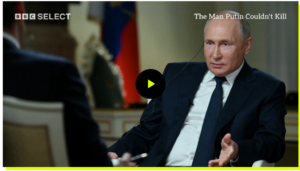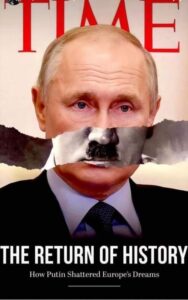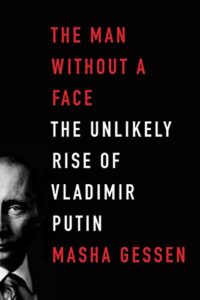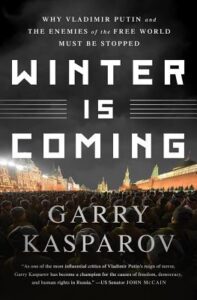 Just as the West overlooked abuses by anti-communist allies during the cold war, it will make ugly compromises now to counter Vladimir Putin’s revanchist Russia, The Economist suggests. Doing so would pose diplomatic and political challenges. Compared with claiming compromise was necessary to resist the specter of communism, it may prove trickier to argue—to allies abroad and voters at home—that one should [distasteful as it may be] curry favor with autocrats in order to confront autocracy:
Just as the West overlooked abuses by anti-communist allies during the cold war, it will make ugly compromises now to counter Vladimir Putin’s revanchist Russia, The Economist suggests. Doing so would pose diplomatic and political challenges. Compared with claiming compromise was necessary to resist the specter of communism, it may prove trickier to argue—to allies abroad and voters at home—that one should [distasteful as it may be] curry favor with autocrats in order to confront autocracy:
So far, the war itself is demonstrating some of democracy’s strengths and autocracy’s drawbacks…..Yet the result of the war is unpredictable, and so too will be its effect on global democracy. If Mr Putin achieves something resembling a victory, that could inspire strongmen everywhere. If he loses, that could inspire those who stand up to them. When Mr Biden reconvenes his democracy summit later this year, much will depend on the courage of Ukrainians, and the support they receive from democracies, with all their flaws.
 Putin apparently believed that the Ukrainians would choose not to fight against Russian invasion—because, he claimed, its inhabitants were really Russians, or because Ukraine was ruled by Nazis and its citizens would welcome liberation, notes Michael Walzer, a professor emeritus at Princeton’s Institute for Advanced Study and the author of “Just and Unjust Wars.”
Putin apparently believed that the Ukrainians would choose not to fight against Russian invasion—because, he claimed, its inhabitants were really Russians, or because Ukraine was ruled by Nazis and its citizens would welcome liberation, notes Michael Walzer, a professor emeritus at Princeton’s Institute for Advanced Study and the author of “Just and Unjust Wars.”
If either of those beliefs had been true, we might not call the Russian war aggression. But the Ukrainians have proven them false. They have proven the value of Ukrainian statehood and the reality of Ukrainian democracy by fighting and dying to defend both, he writes for The Wall Street Journal.
Many in the West hoping for Putin’s overthrow do not understand Russia or the attitudes that people there have toward power, according to one observer.
Russian scholars have long noted that the absence of private property rights and impartial legal authority lead to state actors holding the power that determines the lives of Russians in every way. Beyond its borders, Russia has since the 15th century exerted its power through military aggression. In a country where power is nearly everything, sanctions and lost fortunes alone will not change that fundamental dynamic, former deputy assistant secretary of state for South and Central Asia Eileen O’Connor writes for The Times:
In 1996, when I was the Moscow bureau chief for CNN, a battle was underway between a faction of corrupt oligarchs and cronies of President Boris Yeltsin’s bodyguard, who was demanding more money from them for political “protection” and threatening to upend planned elections. I asked Anatoly Chubais, who was then the deputy prime minister, the question that seemed at the heart of the fight: What is more important to Russians, power or money? He replied, “If you have to ask, you don’t understand Russia.” The answer was power.
The only people who can truly sway Mr. Putin are ideologues who share his views, the so-called siloviki, O’Connor adds. And like Mr. Putin, they see the dissolution of the Soviet Union as the greatest catastrophe of the 20th century, and believe this fight is for Russia’s “sovereignty and the future of our children.”
 Putin badly underestimated Western resolve, says Yale historian Timothy Snyder: For me the most revealing text here is the victory declaration, which the Russian press agency accidentally published on Feb. 26. What they say is that the West just basically needed one more push to fall into total disarray, he tells The Post.
Putin badly underestimated Western resolve, says Yale historian Timothy Snyder: For me the most revealing text here is the victory declaration, which the Russian press agency accidentally published on Feb. 26. What they say is that the West just basically needed one more push to fall into total disarray, he tells The Post.
In her 2012 biography of Putin, “The Man Without a Face: The Unlikely Rise of Vladimir Putin,” Russian American journalist Masha Gessen observed that Putin’s unabashed description of himself as “a thug” was key to his self-image, The Times reports.
After Russia’s 2014 annexation of Crimea, Gessen wrote a postscript summarizing Putin’s increasingly aggressive stance toward Western democracies, and his evolution from “a bureaucrat who had accidentally been entrusted with a huge country into a megalomaniacal dictator who believed he was on a civilizational mission.”
 She recommends a number of books for understanding Putin, including ‘Winter Is Coming: Why Vladimir Putin and the Enemies of the Free World Must Be Stopped,’ by Garry Kasparov.
She recommends a number of books for understanding Putin, including ‘Winter Is Coming: Why Vladimir Putin and the Enemies of the Free World Must Be Stopped,’ by Garry Kasparov.
“Kasparov thinks about life as chess. And he looks at this as a series of plays. He doesn’t look at Putin’s psychology so much as he looks at the logic of his actions and says, ‘OK, well, this is how we game it out.’ And it is not uplifting. I mean, the book is not recent, and he was quite sure then that Putin was at war with the west at that point,” Gessen observes.
Similarly, social scientist and former politician Balint Magyar examines the ways in which post-communist regimes have given rise to autocrats who have cracked down on media and political dissent. ‘The Anatomy of Post-Communist Regimes’ is so incredibly illuminating, she adds, while “The Post-Communist Mafia State,” which pretends to be about Hungary, is the best book for understanding post-Communist Russia and how the regime works.” RTWT
One day the devastated cities of Ukraine will be rebuilt, and the work will require assistance from outside, Princeton’s Walzer observes. This will be an international project but not a cosmopolitan one; it won’t be citizens of the world who will join in but rather citizens of many states who will press their governments to provide the necessary funds.
The state remains the critically necessary agent of humanity’s well-being. It is also, too often, the agent of persecution and war. That’s why we still need theories of justice that address the actually existing state system, warn of its dangers and explain its value, he writes in The Journal. RTWT







